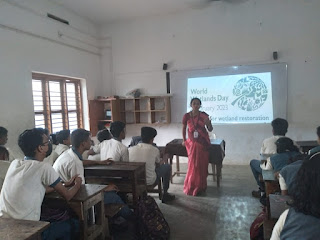Hot Potatoes- MCQ
Technology and Communication in Education- MCQ
1. Website is a collection of ?
a) Audio files
b) Image files
c) Video files
d) HTML files
2. Information Technology(IT) Act 2000 came into force on?
a) 17 October 2000
b) 9 June 2000
c) 1 June 2000
d) 1 October 2000
3. Who is known as the father of modern media education?
a) Edger Dale
b) Flanders
c) Erikson
d) Charles Babbage
4. _______ was the first district wide e-Literacy project in India.
a) C-DIT
b) IT@school
c) NIC
d) Akshaya
5. The use of technology to enhance learning process is called _____ in education.
a) Information Technology
b) Information Communication Technology
c) Communication Technology
d) None of the above
6. _____ is a legal term used to describe the rights that creators have over their works.
a) Plagiarism
b) Copyright
c) Legal right
d) Phishing
7. Which of these is not a component of a computer network?
a) Sender
b) Protocol
c) Speakers
d) Data
8. Method used to transfer information to far off places instantly is called?
a) Data
b) Information Technology
c) Language
d) Tele communication
9. Which among the following is not a component of communication?
a) Technology
b) Sender
c) Receiver
d) Feedback
10. Mix of online and offline learning is called?
a) M-Learning
b) E-Learning
c) Blended learning
d) Web-base learning
11. Web 3.0 is also known as?
a) Read- Write web
b) Wisdom web
c) Read, Write, Executable web
d) Symbiotic web
12. Multi-sensory approach is also known as?
a) Audio-Visual Aids
b) Smart Classroom
c) VAKT
d) Teleconferencing
13. Who inaugurated VICTERS?
a) Dr. Manmohan Singh
b) Dr. A P J Abdul Kalam
c) A K Antony
d) Dr. Madhavan
14. What is the full form of CAI?
a) Computer Assisted Information
b) Computer Assisted Instructuion
c) Computer Applied Instruction
d) Computer Authorised Information
15. _____ is a tool that is used to detect and remove malicious software.
a) Malware
b) Antivirus
c) Firewall
d) Trojan
----------Key----------
1. (d)
2. (a)
3. (a)
4. (d)
5. (b)
6. (b)
7. (c)
8. (d)
9. (a)
10. (c)
11. (c)
12. (c)
13. (b)
14. (b)
15. (b)



Comments
Post a Comment